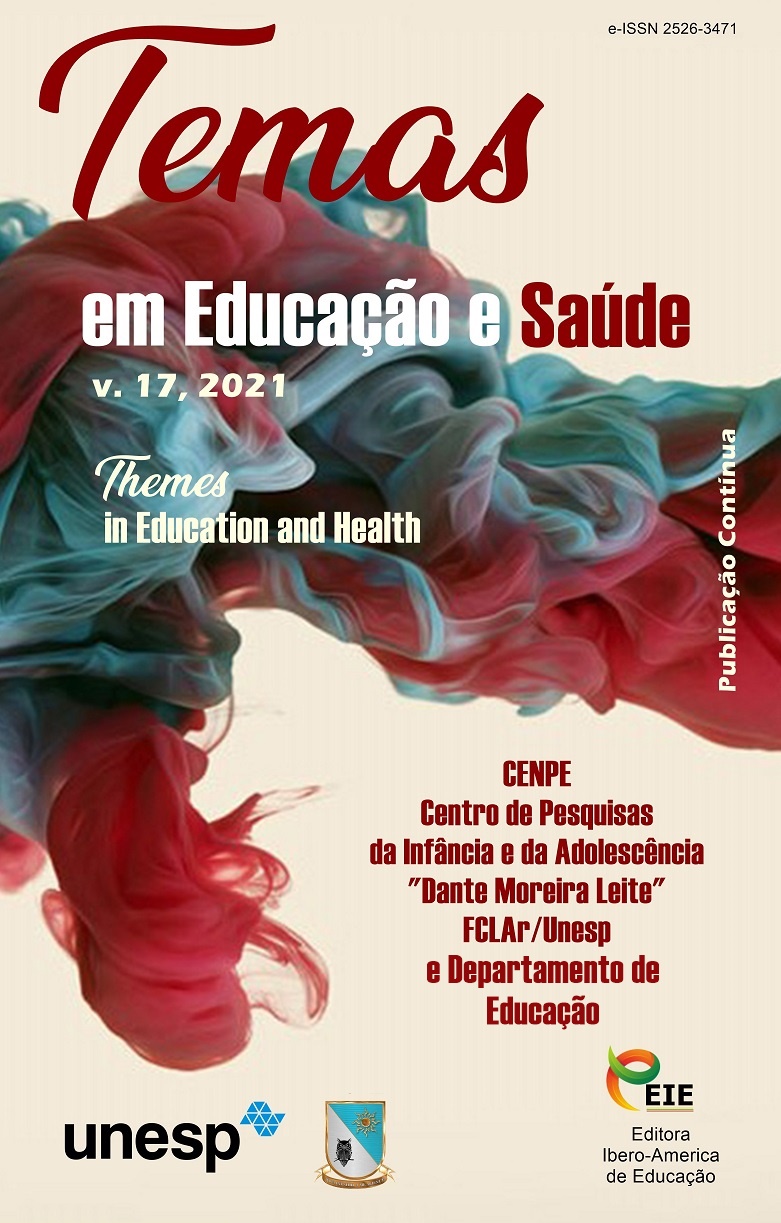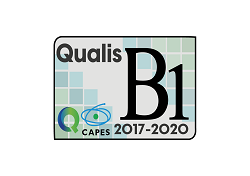Health and teachers in a sick society: a study in the field of postgraduate in education
DOI:
https://doi.org/10.26673/tes.v17i00.15393Keywords:
Literacy, Health, Culture, PostgraduateAbstract
The article is about the health literacy of teachers in a postgraduate education program at a federal university in Brazil. The objective is to understand, within the reality of Brazilian higher education, if these professionals exercise their understanding, management and investment skills to adopt a healthy lifestyle. Through semi-structured interviews, ten professors answered a European questionnaire culturally adapted and validated in Brazil, added to open questions by the authors, the method used during the investigation process was participant observation and took place in the institution's facilities. We conclude that 80% of respondents have health literacy, but 70% of the professors have some pathology, despite exercising their understanding and management skills for their health, however, the investment is hampered by the fact of the unavailable time for the adoption of a healthy lifestyle of 70% of respondents.
Downloads
References
ALMEIDA, K. A pós-graduação no Brasil: história de uma tradição inventada. 2017. 213 f. Tese (Doutorado) – Faculdade de Educação, Universidade Estadual de Campinas, Campinas, 2017.
BARRETT, S.; PURYEAR, J.; WESTPHELING, K. Health literacy practices in primary care settings: examples from the field. Nova Iorque: The Commonwealth Fund., 2008. Disponível em: www.commonwealthfund.org/usr_doc/Barrett_hltliteracypracticesprimarycaresettingsexamplesfield_1093.pdf?section=4039 Acesso em: 01 set. 2018.
BENAVENTE, A. A Literacia em Portugal. Lisboa: Fundação Calouste Gulbenkian/ Conselho Nacional de Educação, 1996.
BOURDIEU, P. Os usos sociais da ciência: por uma sociologia clínica do campo científico. São Paulo: UNESP, 2004. 86 p.
BRANDÃO, C. Pesquisa participante. São Paulo: Brasiliense, 1999.
CASSANDRE, M. A Saúde de Docentes de Pós-graduação em Universidades Públicas: Os Danos Causados pelas Imposições do Processo Avaliativo. Revista Mal-estar e subjetividade, v. 11, p. 779-816, jun. 2011. Disponível em: http://pepsic.bvsalud.org/pdf/malestar/v11n2/13.pdf. Acesso em 03 jan. 2019.
CATANI, A. M.; CATANI, D. B.; PEREIRA, G. R. M. Pierre Bourdieu: as leituras de sua obra no campo educacional brasileiro. In: TURA, M. L. R. (org.) Sociologia para educadores. 4. ed. Rio de Janeiro: Quartet, 2006.
FREUD, S. (1920-1922). Além do Princípio de Prazer, Psicologia de Grupo e outros trabalhos. Edição standard brasileira das obras psicológicas completas de Sigmund Freud. Rio de Janeiro: Imago, 1996.
FREUD, S. O futuro de uma ilusão. Edição Standard Brasileira das Obras Completas de Sigmund Freud. Rio de Janeiro: Imago, 1996[1927].
FREUD, S. O mal-estar na civilização. Edição Standard Brasileira das Obras Completas de Sigmund Freud. Rio de Janeiro: Imago, 1996[1930/1929].
GEERTZ, C. A interpretação das culturas. Rio de Janeiro: Editora LTC, 2008.
HEALTH Canada. Toward a healthy future: second report on the health of Canadians. 1999. Disponível em: www.hc-sc.gc.ca/hppb/phdd/report.html. Acesso em: 01 set. 2018.
HOWARD, A. S. Um testamento agrícola. 1. ed. São Paulo: Expressão Popular, 2007.
KICKBUSCH, I. Health literacy: addressing the health and education divide. Health Promotion International, 2001.
KICKBUSCH, I.; WAIT, S.; MAAG, D. Navigating health: the role of health literacy. London International Longevity Centre. Alliance for Health and the Future, 2006.
KLEINMAN, A.; EINSENBERG, L.; GOOD, B. Culture, illness, and care: clinical lessons from anthropologic and cross-cultural research. Annals of Internal Medicine, Philadelphia, v. 88, p. 251-258, 1978.
LÉVI-STRAUSS, C. Antropologia Estrutural. 6. ed. Rio de Janeiro: Tempo Brasileiro, 2003.
LÉVI-STRAUSS, C. Introdução à obra de Marcel Mauss In: Sociologia e Antropologia. São Paulo: COSACNAYF, 2003.
MONTEIRO, M. M. C. F. A Literacia em Saúde. 2009. Dissertação (Mestrado em Ciências da Educação) – Departamento das Ciências de Educação, Universidade Lusófona de Humanidades e Tecnologias, 2009.
MOROSINI, M. C. (org.). Professor do ensino superior: identidade, docência e formação. Brasília: Instituto Nacional de Estudos e Pesquisas Educacionais, 2000.
NOGUEIRA, M. A.; CATANI, A. (org.). Pierre Bourdieu. Escritos de educação. 16. ed. Petrópolis: Vozes, 2015.
NUTBEAM, D. Health literacy as a public health goal: a challenge for contemporary health education and communication strategies into the 21st century. Health Promotion International, 2000.
NUTBEAM, D. The evolving concept of health literacy. Social, Science & Medicine, 2008.
OLIVEIRA, H. B. A Formação Pedagógica de professores na pós-graduação stricto sensu: Os casos UFU e UFMG. Poíesis Pedagógica, v. 9, n. 2, p. 03-19, ago./dez. 2012.
OMS. ORGANIZAÇÃO MUNDIAL DA SAÚDE. Health promotion glossary. Genebra, 1998.
SABOGA, N. et al. Cross-cultural adaptation and validation to portuguese of the european health literacy survey (HLS-EU-PT). Aten Primaria, p. 46-13, 2014.
SABOGA, N. Literacia para a saúde: compreendendo seu alcance, objetivos, metodologia e contribuição no contexto da promoção da saúde. Grupo de Disciplinas de Estratégias de Acção em Saúde. In: Secção de Saúde Pública e Comunidade Escola Nacional de Saúde Pública. Universidade NOVA de Lisboa, 2016.
SIMONDS, S. K. Health education as social policy. Health Education Monograph, 1974.
SOARES, S. A. (org.). A Educação Superior no Brasil. Brasília: Coordenação de Aperfeiçoamento de Pessoal de Nível Superior, 2002.
SOCIAL Determinants of Health: The Solid Facts, 2003. Disponível em: http://www.euro.who.int/__data/assets/pdf_file/0005/98438/e81384.pdf Acesso em: 22 jul. 2019.
TONES, K. Health literacy: new wine in old bottles. Health Education Research, 2002.
UNESCO. Youth and Adult Literacy in Brazil: learning from practice. Disponível em: https://www.google.com.br/search?q=UNESCO+(2009).+Education%2FLiteracy.&oq=UNESCO+(2009).+Education%2FLiteracy.&aqs=chrome..69i57.536j0j7&sourceid=chrome&ie=UTF-8. Acesso em: 01 set. 2018.
VECCHIATTI, K. Três fases rumo ao desenvolvimento sustentável: do reducionismo à valorização da cultura. Perspectivas, São Paulo, v. 18, n. 3, jul./set. 2004.
VOZIKIS, A. Health literacy among university students in Greece: Determinants and association with self-perceived health, health behaviours and health risks. Archives of Public Health, 2014.
WULFF, H. R.; PEDERSEN, S. A.; ROSENBERG, R. Filosofia Della Medicina. Milano: Raffaello Cortina Editore, 1995.
ZABALZA, M. A. O ensino universitário: seu cenário e seus protagonistas. Porto Alegre: Artmed, 2004.
Published
How to Cite
Issue
Section
License
Os manuscritos aceitos e publicados são de propriedade da Temas em Educação e Saúde. Os artigos publicados e as referências citadas na Temas em Educação e Saúde são de inteira responsabilidade de seus autores. É vedada a tradução para outro idioma sem a autorização escrita do Editor ouvida a Comissão Editorial.







